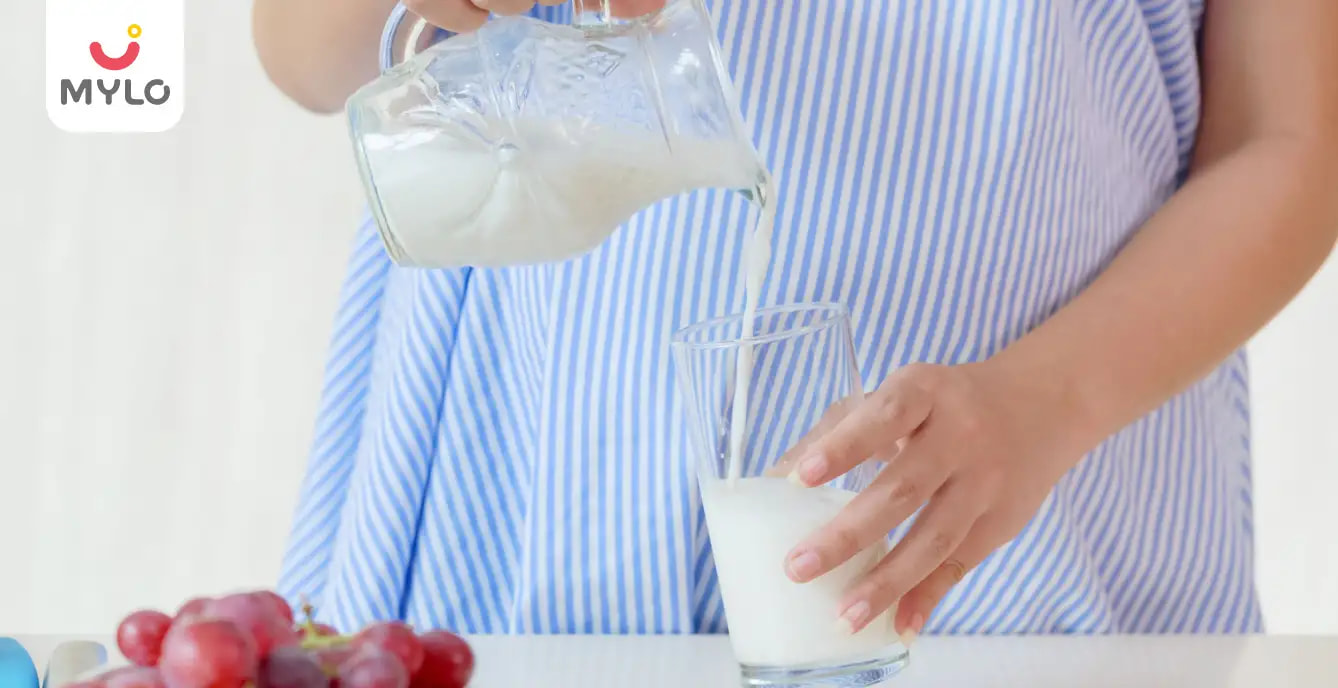Home

Which Month Breast Milk Start During Pregnancy?
In this Article

Breast Changes
Which Month Breast Milk Start During Pregnancy?
Updated on 3 November 2023



Medically Reviewed by
Dr. Shruti Tanwar
C-section & gynae problems - MBBS| MS (OBS & Gynae)
View Profile

If you're expecting a baby, you must have already started to worry about their nutrition, growth and development. And there's no better source of nutrition for babies than their mothers' breast milk. As a result, it's natural to wonder when does breast milk come in during pregnancy. While some women may experience milk production and even leakage during pregnancy, others may not start producing milk until after delivery.
In this article, we'll explore the factors that can affect the arrival and production of breast milk in pregnancy, signs milk is coming in during pregnancy and what to do if your milk is delayed. Whether you're a first-time mother or have had previous pregnancies, this article will provide valuable insights to help you prepare for your baby's arrival.
Which Month Breast Milk Start During Pregnancy?
Pregnant women typically start to produce breast milk around the 16th to 22nd week of pregnancy i.e. 4-5th months and second trimester. However, it can also start as early as the first trimester or as late as the third trimester. The milk produced during pregnancy is called colostrum and is very high in nutrients and antibodies, which helps protect newborns from infections.
When breast milk begins to be produced during pregnancy is different for every woman. It can start as early as the third month or as late as the last or ninth month. If you have never been pregnant before, chances are that you will not notice any changes in your breasts until the fourth or fifth month. By then, most women's breasts have increased in size and begun to produce milk. At such a time, women can invest in maternity dresses to accomodate their changing shape and breast pads to absorb any leakage they may experience.
Some women, however, do not notice any changes until they are well into their sixth month or even later. If you are concerned that you are not producing milk, talk to your doctor. They can help ensure that you are healthy and that your baby gets the nutrition they need.
When Does Milk Start Leaking During Pregnancy?
Milk leakage, also known as colostrum, can start during pregnancy for some women, but it is not a universal occurrence. Typically, colostrum production begins in the second or third trimester of pregnancy, usually around the midpoint of pregnancy or a bit later. However, this can vary from woman to woman, and some may notice leaking breast during pregnancy earlier, while others may not experience it at all during pregnancy.
Some women may find that their breasts feel fuller or tender during pregnancy, and colostrum leakage may occur when the nipples are stimulated, such as during sexual activity or a warm shower. It is essential to remember that every pregnancy is different, and the presence or absence of colostrum leakage during pregnancy is not an indicator of one's ability to breastfeed successfully. After childbirth, regular breastfeeding stimulates the production of mature breast milk, replacing the colostrum with the milk necessary to meet the baby's nutritional needs.
When Does Breast Milk Come In After Delivery?
Now that you know when does breast milk come in during pregnancy, it's also important to know when your body starts releasing breast milk after delivering the baby. After delivery, it takes about 3-4 days for the milk to "come in," and for the breasts to feel firmer, indicating an increase in milk supply.
The second phase, transitional milk, replaces colostrum, and changes in color from yellow to bluish-white, adapting to the baby's needs. The third phase, mature milk, is produced 10-15 days after birth and contains all the necessary nutrients for the baby's growth and development. It's important to understand the process of breast milk production and be prepared for breastfeeding before the baby arrives.
You may also like: Top 5 Things a Breastfeeding Mother Should Invest in and Why?
Signs Milk is Coming in During Pregnancy
There are certain that can tell that your body has started producing breast milk. These include:
- breast engorgement
- swelling of the breasts
- leaking breast during pregnancy (particularly overnight)
- feeling of fullness, heaviness and/or firmness
- pain or soreness in the breasts
It is important to note that hormones play a significant role in milk production during pregnancy and breastfeeding. Whereas when milk comes from breast during pregnancy can depend on hormones, your nutritional status and health conditions.
What to Do If Your Breast Milk Production is Delayed?
Some women's breasts may never produce milk or may only produce a small amount. This is most often due to medical conditions such as diabetes, thyroid disorders, certain medications, or insufficient glandular tissue. Hormonal imbalances, previous breast surgery, and psychological factors can also play a role. If you're having trouble producing breast milk, talk to your doctor about possible causes and treatment options.
If you are experiencing delayed breast milk in pregnancy, it's important to speak with your healthcare provider to rule out any underlying medical conditions that may be contributing to the issue. Maternal factors such as stress, anxiety, and existing health conditions can affect milk production. Additionally, nutritional status, partner's support, and overall health can influence lactation outcomes. Maintaining a healthy lifestyle and seeking medical attention if necessary are important steps to ensure optimal milk production and breastfeeding success.
Conclusion
It's normal for an expecting mom to have concerns around breastfeeding and whether she'll be able to do it well. To make this journey less daunting and reduce any potential anxieties, it is advisable to seek assistance from a lactation consultant even before the baby's arrival. Knowing which month breast milk start during pregnancy and if your production is delayed can help you adopt a proactive approach. This proactive approach can help you prepare for potential challenges and navigate the breastfeeding process with greater ease.
References
- Asztalos, E.V., Kiss, A., da Silva, O.P. et al. (2018). Pregnancy gestation at delivery and breast milk production. MHNP Journal
- Pillay J, Davis TJ. (2018). Physiology, Lactation. NCBI
Tags
Which Month Breast Milk Start During Pregnancy in Bengali, Which Month Breast Milk Start During Pregnancy in Tamil





Medically Reviewed by
Dr. Shruti Tanwar
C-section & gynae problems - MBBS| MS (OBS & Gynae)
View Profile


Written by
Priyanka Verma
Priyanka is an experienced editor & content writer with great attention to detail. Mother to an 11-year-old, she's a ski
Read MoreGet baby's diet chart, and growth tips

Related Articles
RECENTLY PUBLISHED ARTICLES
our most recent articles

Diet & Nutrition
গর্ভাবস্থায় আলুবোখরা: উপকারিতা ও ঝুঁকি | Prunes During Pregnancy: Benefits & Risks in Bengali

Diet & Nutrition
গর্ভাবস্থায় হিং | ঝুঁকি, সুবিধা এবং অন্যান্য চিকিৎসা | Hing During Pregnancy | Risks, Benefits & Other Treatments in Bengali

Women Specific Issues
স্তনের উপর সাদা দাগ: লক্ষণ, কারণ এবং চিকিৎসা | White Spots on Nipple: Causes, Symptoms, and Treatments in Bengali

Diet & Nutrition
গর্ভাবস্থায় পোহা: উপকারিতা, ধরণ এবং রেসিপি | Poha During Pregnancy: Benefits, Types & Recipes in Bengali

Diet & Nutrition
গর্ভাবস্থায় মাছ: উপকারিতা এবং ঝুঁকি | Fish In Pregnancy: Benefits and Risks in Bengali

Diet & Nutrition
গর্ভাবস্থায় রেড ওয়াইন: পার্শ্ব প্রতিক্রিয়া এবং নির্দেশিকা | Red Wine During Pregnancy: Side Effects & Guidelines in Bengali
- ইনার থাই চ্যাফিং: কারণ, উপসর্গ এবং চিকিৎসা | Inner Thigh Chafing: Causes, Symptoms & Treatment in Bengali
- গর্ভাবস্থায় ব্রাউন রাইস: উপকারিতা ও সতর্কতা | Brown Rice During Pregnancy: Benefits & Precautions in Bengali
- Velamentous Cord Insertion - Precautions, Results & Safety
- Unlock the Secret to Flawless Skin: 7 Must-Have Qualities in a Face Serum
- Unlock the Secret to Radiant Skin: How Vitamin C Serum Can Transform Your Complexion
- Gender No Bar: 10 Reasons Why Everyone Needs a Body Lotion
- Unlock the Secret to Radiant Skin How to Choose the Perfect Body Lotion for Your Skin Type
- Top 10 Reasons to Apply a Body Lotion After Every Bath
- Communication in Toddlers: Milestones & Activities
- How to Improve Vocabulary for Toddlers?
- A Comprehensive Guide to Understanding Placenta Accreta
- Vulvovaginitis in Toddlers Causes, Symptoms and Treatment
- A Comprehensive Guide to Understanding Cerebral Palsy in Children
- Bitter Taste in Mouth During Pregnancy: Understanding the Causes and Remedies


AWARDS AND RECOGNITION

Mylo wins Forbes D2C Disruptor award

Mylo wins The Economic Times Promising Brands 2022
AS SEEN IN

- Mylo Care: Effective and science-backed personal care and wellness solutions for a joyful you.
- Mylo Baby: Science-backed, gentle and effective personal care & hygiene range for your little one.
- Mylo Community: Trusted and empathetic community of 10mn+ parents and experts.
Product Categories
Baby Carrier | Baby Soap | Baby Wipes | Stretch Marks Cream | Baby Cream | Baby Shampoo | Baby Massage Oil | Baby Hair Oil | Stretch Marks Oil | Baby Body Wash | Baby Powder | Baby Lotion | Diaper Rash Cream | Newborn Diapers | Teether | Baby Kajal | Baby Diapers Pants | Cloth Diapers | Laundry Detergent | Lactation Granules |








